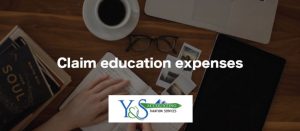
Self-education expenses are the costs you incur to undertake a course of study at a school, college, university or other recognised place of education.
If you work and study and incur self-education expenses you may be eligible for tax deductions.
ELIGIBILITY TO CLAIM
Your current employment and the course you undertake must have sufficient connection for your self-education expenses to qualify as a work-related tax deduction. If a course of study is too general in terms of your current income-earning activities, the necessary connection between the self-education expense and your income-earning activity does not exist.
A tax deduction for your self-education expenses related to your work as an employee is available if you work and study at the same time and can satisfy any of these conditions:
✅ You are upgrading your qualifications for your current employment – for example, upgrading from a Bachelor qualification to a Masters qualification
✅ You are improving specific skills or knowledge used in your current employment – for example, a course that will allow you to operate more machinery at work
✅ You are employed as a trainee and you are undertaking a course that forms part of that traineeship – for example, an overseas trained person employed as an intern while doing a bridging course
✅ You can show that at the time you were working and studying, your course led, or was likely to lead to an increase in employment income – for example, a teacher who will automatically get a pay increase as a result of completing the course.
ELIGIBLE COURSES
Self-education expenses are deductible when the course you undertake leads to a formal qualification and meets the following conditions.
The course must have a sufficient connection to your current work activities as an employee and:
✅ Maintain or improve the specific skills or knowledge you require in your current work activities
✅ Result in, or is likely to result in, an increase in your income from your current work activities.
You can’t claim a deduction for self-education expenses for a course that doesn’t have a sufficient connection to your current work activities even though it:
❌ Might be generally related to it
❌ Enables you to get new employment – such as moving employment as a nurse to employment as a doctor.
EXPENSES YOU CAN CLAIM
You can claim a deduction for following expenses related to your eligible self-education:
✅ Accommodation and meals (if away from home overnight)
✅ Car expenses
✅ Computer consumables
✅ Course fees
✅ Decline in value for depreciating assets (cost exceeds $300)
✅ Purchase of equipment or technical instruments (costing $300 or less)
✅ Equipment repairs
✅ Fares
✅ Home office running costs
✅ Interest
✅ Internet usage (excluding connection fees)
✅ Parking fees (only for work-related claims)
✅ Phone calls
✅ Postage
✅ Stationery
✅ Student union fees
✅ Student services and amenities fees
✅ Textbooks
✅ Trade, professional, or academic journals
✅ Travel to-and-from place of education (only for work-related claims).
Some travel for journeys can’t be claimed, but you may be able to offset the cost of these journeys against the $250 reduction.
If an expense is partly for your self-education and partly for other purposes, you can only claim the amount that relates to your self-education as a deduction.
EXPENSES YOU CAN’T CLAIM
You can’t claim the following expenses in relation to your self-education:
❌ Tuition fees paid by someone else
❌ Repayments of Higher Education Loan Program (HELP) loans (although the fees paid by some HELP loans are)
❌ Student Financial Supplement Scheme (SFSS) repayments
❌ Student Start-up Loan (SSL) repayments)
❌ Trade Support Loan Program (TSL) repayments
❌ Home office occupancy expenses
❌ Accommodations and meals
RECORDING SELF-EDUCATION EXPENSES
You may need to keep receipts or other documents showing your self-education expenses such as:
🔘 Course fees
🔘 Textbooks
🔘 Stationery
🔘 Decline in value of and repairs to depreciating assets.
You must also keep receipts, documents or diary entries for travel expenses.
